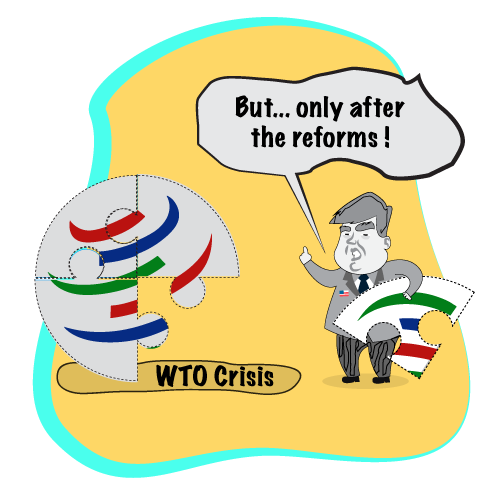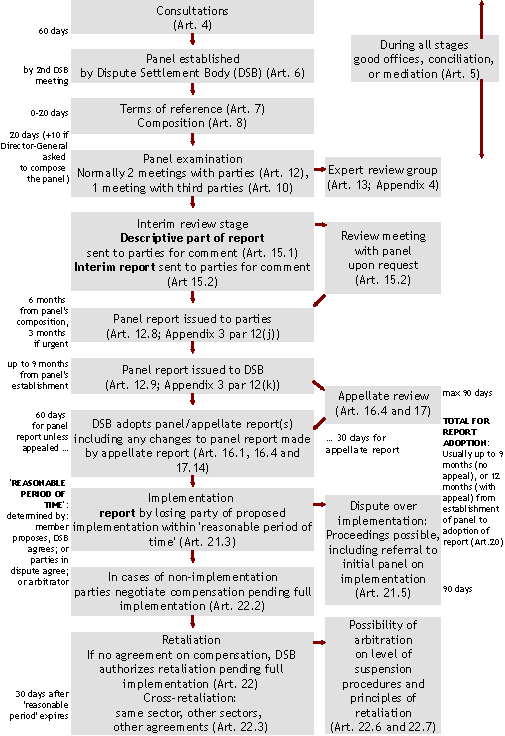The WTO Appellate Body Crisis- Problem, Relief and Solution

In the year 1994, the trading world as we know it was awarded with an International Body known as the World Trade Organisation or as popularly referred as the ‘WTO’. This supreme International organization deals with the ‘Rule of Trade’ between Nations and governs trade matters including Goods and Services. When moving into a more globalized world, a fluid yet stringent mechanism was required to synchronise all of the transactions that took place between Nations and countries as a whole involving global markets and to manage this setting, the WTO played an important role.
At its heart, the WTO functions largely with Agreements. The Agreements govern the subject-matter enshrined in their Preamble. These Agreements are negotiated and signed by the bulk of the world’s trading nations and are then ratified in their respective Parliaments. These consist of The General Agreement On Tariffs And Trade (GATT), and General Agreements On Trade In Services (GATS). Without these Agreements, the governing nations would not have a legal stand to fight their battles. Considering that all of their trade and negotiations happens through Agreements, the WTO must have a strong redressal mechanism to ward off disputes, if any. The fact of the matter remains that the WTO would not be able to operate effectively without a well functioning Dispute Resolution System, thus giving way to the birth of the WTO’s Dispute Settlement System (i.e) the DSS.
Rise of Appellate Body Crisis
The WTO adopted the DSS which was then governed by a Dispute Settlement Body (i.e) DSB. Just like any other Governing body, this system acts as a platform for the WTO members to settle their disputes with the other WTO members in case of any breach or violation in their Agreements.
The DSS operates in a hierarchical structure. The stages in a typical WTO dispute settlement case are as follows:
(i) Consultations between the Parties
(ii) Adjudication by the Panels and, if applicable, by the Appellate Body; and
(iii) the implementation of the ruling, which includes the possibility of Counter statements in the event of failure by the losing Party to implement the ruling

The two main ways to settle a dispute once a complaint has been filed with the WTO are:
- The Parties find a mutually agreed solution, particularly during the phase of Bilateral consultations
- Through Adjudication, including the subsequent implementation of the panel and the Appellate Body Reports which are binding upon the Parties once adopted by the DSB.
So if by starting with consultations, and they happen to fail, then the complaining Party can request the DSB to establish a Panel Body to resolve the dispute. On the top of the hierarchy comes the Appellate Body which shall hear the Appeal.
The Appellate Body is normally composed of 7 members but currently it only has 3 which is the minimum number to function. On 10.12.2019, the mandates of the two of the remaining three Appellate Body Members expired and the Organisation was not in a position to decide on appeals in Trade disputes between WTO Members.
The process to fill the vacancies was faltered in 2016 when the US began to veto the appointment of new Appellate Body Members because of its concerns regarding the allocation of powers and functioning of the WTO Appellate Body.
So out of the 7 member body currently there are 6 vacancies that need to be filled and out of the seven persons, three of whom shall serve on any one case. The appointed persons serve for a period of four years and thereafter vacancies shall be filled as they arise.
With the compulsory jurisdiction of DSS under WTO as per the terms of Article 1 of Dispute Settlement Understanding rules (hereinafter DSU rules) which governs the Settlement System, the DSS is recognized as one of the most powerful ‘quasi-judicial politico’ institutions of the modern global village. However, this celebrated Settlement System is at present, under crisis.
The Turning Point
The guardian angel of International Trade is facing an unprecedented deadlock in its Dispute Resolution mechanism. The Appellate Body is going through a situation of upheaval.
On 11 December, 2019, the problem that severed the crisis was that of the term of two of the Appellate Body members out of remaining three came to an end. As per the structural requirements for the Appellate Body to hear the dispute, three members are required to hear any dispute in a given case. However, after the tenure of two members came to an end, there has been no initiation proceedings to fill up the vacancies. The Appointment of members has been halted recently because the United States vetoed the procedure of Appointments of new members.
The consent to allow the Appointment procedures to take place must be ‘allowed’ by the United States and if that does not happen, the Appellate Body stands defunct as of today.
The reason for the US to block the Appointment is its long standing concern of overreaching power of the Appellate Bodies as well as unreasonable delay coupled with in-appropriate standards of Appellate review.
The US has often criticized the Appellate Body for straying from its original mandate by issuing decisions that add or diminish rights and obligations of member states. The US has not agreed to give assent for the Appointment of new members unless the other WTO members agree to find a solution to what the US sees as ‘persistent overreach’ by the Appellate Body. The US has often raised the demand of amending the binding powers of the Appellate Body to non-binding powers that existed earlier in case of GATT, 1947. Thus, the two-tier Dispute Settlement System has been given a big blow by the US and therefore, bringing the redressal functioning to an unprecedented halt for an indefinite period of time.
Alternatives to Battle against the Crisis
Certainly, the present condition shall impede the trade Dispute Resolution Mechanism but there is always a silver lining as in the present case. Article 25 of the DSU rules that govern the Settlement procedure offers the International trade forum with an alternative to overcome the Dispute Settlement crisis. Article 25 provides with ‘commitment to expeditious arbitration as an alternative means of dispute settlement’. This provision gives the Party a free hand to decide as to how they would like the proceedings to take place and what aspects are required to be discussed before the self-chosen Arbitrators.
These proceedings cannot be hampered by the US’s unilateral decision and therefore, it would act as a Parallel Body to address the Disputes much like the original Appellate Body.
The binding force to such Award can be the bilateral or plurilateral Agreements with a specific clause that states the effect of such Award as well as the provisions of enforcement of the Award. This shall be the most likely available methodology of Dispute Resolution available in the framework under the WTO because doing away with the consensus decisions and appointing the Appellate body members while ignoring the USA will not be an ideal step because of two reasons; firstly, because it would violate the right of negative consensus which the USA has as per the DSU rules and secondly, the USA shall become hostile towards WTO and the WTO Dispute Resolution Mechanism without the USA is just like a toothless tiger. Therefore, Arbitration under Article 25 can act as an interim solution to sustain the dysfunctional crisis.
The other alternative to battle with the crisis is to explore and exhaust the Dispute Redressal Forums outside the WTO framework. Parties can enter into a plurilateral Agreement in which they can choose a mechanism for redressal. To give an example, the World Intellectual Property Organization (WIPO) has an ADR cell that not only provides a forum for Intellectual property matters but also has an enhanced jurisdiction which offers in particular Arbitration and Mediation, for the resolution of International Commercial Disputes between private Parties.
Therefore, it is upto the member countries to decide an appropriate forum as an Interim Body to continue the smooth functioning of the WTO.
Taking up the US Proposal of Reforms
Although, these solutions are just Interim Reliefs and cannot replace the originality and superiority that the WTO Dispute Settlement System (DSS) enjoys. Even these mechanisms are not foolproof but they can be claimed as the last resort to protect the global trade environment and to keep the united motion in a dynamic state for the time being until the USA either gives the consensus to appoint Appellate Body members or WTO as a whole agrees to bring reforms according to the whims and fancies of the USA and thus achieving the status quo ante bellum.
In conclusion, it is just not the US who has such concerns in regard to the Appellate Body, but these concerns are shared by other WTO member states as well. However, no other member state has taken such a severe step and their responses have been fairly less subversive.
Therefore, ignoring these concerns and relying solely on the Interim Measures may raise a problem of conflicting decisions in the future and may freeze the functioning of the DSS forever, thus, negatively impacting the spirit of International Economic Cooperation.

